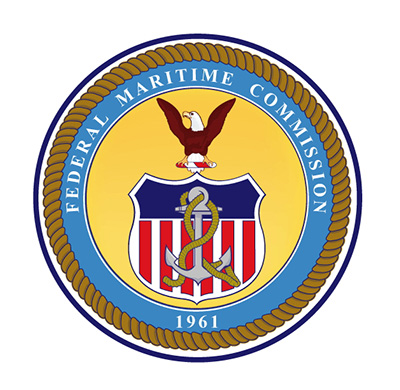FMC kicks off first phase of investigation into port demurrage, detention, and free time practices
Federal Maritime Commission (FMC) Commissioner Rebecca Dye said earlier this week that the initial phase of the investigation into port demurrage, detention, and free time practices has commenced, with the FMC ordering ocean common carriers to provide information and documents to explain these practices, adding that this is also happening United States ports container terminals.
Federal Maritime Commission (FMC) Commissioner Rebecca Dye said earlier this week that the initial phase of the investigation into port demurrage, detention, and free time practices has commenced, with the FMC ordering ocean common carriers to provide information and documents to explain these practices, adding that this is also happening United States ports container terminals.
The FMC voted to kick off this investigation in early March.
This initial phase of the investigation, according to the FMC, is to gather information from ocean common carriers and marine terminal operators that serve a wide array of container ports located in the U.S., adding that carriers have been directed to provide detailed information about their detention and demurrage practices, especially regarding circumstances where shippers are not able to retrieve cargo.
“The ultimate resolution of this investigation will have the potential to affect every ocean common carrier calling the United States,” said Dye in a statement. “It is vital that the information we gather is representative of business and operational practices, as well as market conditions, nationally.” Dye also noted that it is imperative for shippers, motor carriers, and other stakeholders that can “document specific allegations and provide supporting materials of unreasonable port detention and demurrage practices and fees step forward and cooperate with the investigation.”
FMC said correspondence, allegations, and supporting documents regarding the investigation can be sent to either [email protected] or to:
Commissioner Rebecca Dye, Federal Maritime Commission, 800 North Capitol Street, Northwest, Washington, D.C. 20573
FMC said an interim report of the findings and recommendations is due by September 2, 2018, and a final report will be issued to the FMC for consideration, discussion, and vote by December 2, 2018.
The formal launch of this investigation follows a petition filed at the FMC by the Coalition for Fair Port Practices in January, when it held a two-day hearing exploring issues raised by the petition through testimony from shippers, ocean transportation intermediaries, ocean carriers, truckers, and MTOs. This investigation will run through December 2, when a final report of Commissioner Dye’s findings and are recommendations are due to the FMC.
This investigation was somewhat expected, as in September 2017 the FMC held a closed door session to receive a briefing on Petition Number P4-16, the petition of the Coalition for Fair Port Practices for rulemaking. At that session, commissioners reviewed numerous public written comments that have been submitted in response to the Petition of the Coalition for Fair Port Practices Rulemaking. Petition Number 4-16 concerns demurrage, detention and per diem business practices and charges being assessed at various ports.
Albert Saphir, president of ABS Consulting in Weston, Fla., told LM that this investigation was expected in the maritime sector, adding that it is likely to take a lot of time.
“What will come out of it and if at all any use for the trade remains to be seen,” he said. “Obviously, there are a lot of issues and concerns and underlying causes that have caused problems/expense with demurrage (and I think so less with detention) charges.
Saphir said one of the more complex and pressing issues is terminal congestion, noting that in key volume trade lanes vessels are huge now and a major unload and load operation can take 5+ days of port time. This leads to the questions of when should demurrage free time countdown start and when the first containers come off the vessel or when the vessel leaves port?
“Nobody can answer this, this is all new stuff that we have not seen before,” he said. “And how can terminals manage the influx of all these additional container volumes?”
What’s more, Saphir said that the new vessel sharing agreements add even more complexity to the mix, with Maersk and MSC containers on the same vessel and terminal, but are likely needed to be kept separate. Legacy terminal layouts and SOP’s are being challenged, he also said.
As for the demurrage issue, Saphir said it is mostly around the larger volume container carriers and the large terminals that service them.
“In South Florida, there are no reported issues with some of the smaller terminals and carriers such as Seaboard Marine or Crowley, they are doing an excellent job in turning around import and export loads, often with drivers spending less than 30-40 minutes in the terminal and of course no issues with demurrage,” he said. “But it is a delicate balance. And I think it may get even worse now, with the final enforcement of ELD. Drivers (and customers) now are held accountable for correct service hours and too many just did not prepare for it. And customers not willing to pay more for better service. So drivers now are running out of service time while waiting to pick-up containers are ports – some logistics providers have reported 7 or more days of delays at certain ports or inland terminals to get containers.”
Panjiva Research Director Chris Rogers wrote in a research note that the “3 D’s (detention, demurrage, and per diem) saw spikes in fees during the west coast port strikes in 2015 and the Hanjin Shipping crisis of 2016.
“They may become more likely given ongoing extreme weather conditions. The case may bring further disruption to the carriers’ pricing strategies after the end of the Transpacific Stabilization Agreement,” he said. “It’s uncertain whether a previous ‘box club’ investigation led by the DoJ from 2016 has made further progress.”













